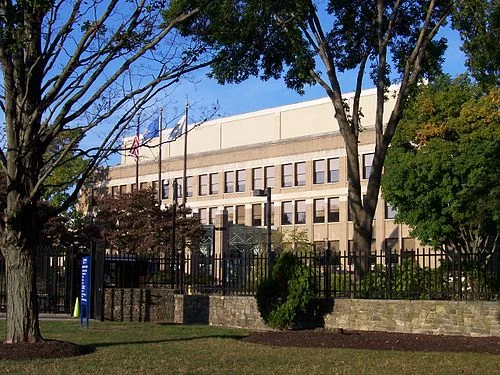
John O. Harney: 'Emergency remote'; a WPA for humanists?; defense workers kept on job
From The New England Journal of Higher Education (NEJHE), a service of The New England Board of Higher Education (nebhe.org):
A few items from the quarantine …
Wisdom from Zoom. COVID-19 has been a boon for Zoom and Slack (for people panicked by too many and too-slow emails). Last week, I zoomed into the Harvard Graduate School of Education (HGSE) Leadership Series conversation with Southern New Hampshire University (SNHU) President Paul LeBlanc and HGSE Dean Bridget Long. LeBlanc notes that the online programs adopted by colleges and universities everywhere in the age of COVID-19 are very different from SNHU’s renowned online platform. Unlike SNHU, most institutions have launched “emergency remote” work to help students stay on track. Despite worries in some quarters about academic quality, LeBlanc says the quick transition online is not about relaxing standards, but ratcheting up care and compassion for suddenly dislocated students. The visionary president notes that just as telemedicine is boosting access to healthcare during the pandemic, online learning could boost access to education.
Among other observations, LeBlanc explains that “time” is the enemy for traditional students who have to pause classes when, for example, their child gets sick. If they are students in a well-designed online program, they can avoid delays in their education despite personal disruptions. He also believes students will want to come rushing back to campuses after COVID-19 dissipates, but with the recession, he wonders if they’ll be able to afford it. Oh and, by the way, LeBlanc ventures that it’s unlikely campuses will open in the fall without a lot more coronavirus testing.
Summer learning loss becomes COVID learning loss. That’s the concern of people like Chris Minnich, CEO of the nonprofit assessment and research organization NWEA, founded in Oregon as the Northwest Evaluation Association. The group predicts that when students finally head back to school next fall (presumably), they are likely to retain about 70% of this year’s gains in reading, compared with a typical school year, and less than 50% in math. The concern over achievement milestones reminds me of the fretting over SATs and ACTs as well as high-stakes high school tests, being postponed. Merrie Najimy, president of the Massachusetts Teachers Association, notes that the pause “provides all of us with an opportunity to rethink the testing requirements.”
Another WPA for Humanists? Modern Language Association Executive Director Paula M. Krebs recently reminded readers that during the Great Depression, the Works Progress Administration, though commonly associated with building roads and bridges, also employed writers, researchers, historians, artists, musicians, actors and other cultural figures. Given COVID-19, “this moment calls for a new WPA that employs those with humanities expertise in partnership with scientists, health-care practitioners, social scientists, and business, to help shape the public understanding of the changes our collective culture is undergoing,” writes Krebs.
Research could help right now. News of the University of New Hampshire garnering $6 million from the National Oceanic and Atmospheric Administration to build and test an instrument to monitor space weather reminded me of when research prowess was recognized as a salient feature of New England’s higher education leadership. That was mostly before jabs like the “wastebook” from then-U.S. Sen. Jeff Flake (R-Ariz.) ridiculed any spending on research that didn’t translate directly to commercial use. But R&D work can go from suspect to practical very quickly. For example, consider research at the University of Maine’s Lobster Institute trying to see if an extract from lobsters might work to treat COVID-19. Or consider that 15 years ago, the Summer 2004 edition of Connection (now NEJHE) ran a short piece on an unpopular research lab being built by Boston University and the federal government in Boston’s densely settled South End to study dangerous germs like Ebola. The region was also a pioneer in community relations, and the neighborhood was tense about the dangers in its midst to say the least. But today, that lab’s role in the search for a coronavirus vaccine is much less controversial.
Advice for grads in a difficult year. This journal is inviting economists and other experts on “employability” to weigh in on how COVID-19 will affect 2020’s college grads in New England. What does it mean for the college-educated labor market that has been another New England economic advantage historically?
Bath Iron Works will keep its employees at work.
Defense rests? One New England industry that is not shutting down due to COVID-19 is the defense industry. In Maine, General Dynamics Bath Iron Works ordered face masks for employees and expanded its sick time policy, but union leaders say the company isn’t doing enough to address coronavirus. More than 70 Maine lawmakers recently asked the company to consider closing temporarily to protect workers from the spread of the virus. But the Defense Department would have to instruct the shipyard to close, and Pentagon officials say it is a “Critical Infrastructure Industry.” About 17,000 people who work at the General Dynamics Electric Boat’s shipyards in Quonset Point, R.I., and Groton, Conn., are in the same boat, so to speak. They too have been told to keep reporting to work. In New London, a letter in The Day pleaded with Connecticut Gov. Ned Lamont to shut down Electric Boat. Critical Infrastructure Industry. If only attack subs on schedule could help beat an “invisible enemy.”
John O. Harney is executive editor of The New England Journal of Higher Education.
Below, “Wong’s Pot with Old Flowers,” by Montserrat College Prof. Timothy Harney.
Don Pesci: Conn., a tax 'donor' state, sure does well with military contracts
Headquarters of military and nonmilitary airplane-engine maker Pratt & Whitney, in East Hartford, Conn. Pratt & Whitney, like Electric Boat, in Groton, Conn., is a unit of General Dynamics.
Some time ago, a Connecticut Trumpeter confessed to this political writer that he had been having a recurrent nightmare.
Military procurements during the Obama administration were slender. Connecticut is still referred to in some corners as “the provision state” because, since the Revolutionary War, Connecticut has provided the national military with provisions. It continues to do so; Pratt & Whitney, Electric Boat and Sikorsky are very much going concerns.
Obama’s military budget was considerably more modest than Trump’s, as the president never tires of reminding the country. Dollars spent on the military are, to no one’s surprise, good for Connecticut. Federal dollars spent on military procurements produce Connecticut jobs, which produce funds that replenish the state’s treasury -- all good, all the time.
This was the nightmare: The additional federal funding would produce additional state treasury dollars, since more job holders produce more tax revenue, and these blessings would allow Trump’s bitterest critics in Connecticut – every member of Connecticut’s all Democratic congressional delegation, plus outgoing Democrat Gov. Dannel Malloy and his retinue -- to claim fraudulently that the state’s ruinous progressive tax and spend policies were responsible for the additional jobs and revenue. Malloy, et al., would point with pride to the job-production figures, attributing the good fortune to his wealth-reduction policies. And this would help his protégé, millionaire Ned Lamont, capture the governor’s office.
According to a recent story in CTMirror, "'Donor state’ Conn. gets more than its fair share of federal contracting dollars,” the Trumpeter’s nightmare has now become a daytime soap opera: “At the beginning of September, Connecticut companies and non-profits had received more than $11.8 billion in federal awards. Electric Boat is in final negotiations for the next block of Virginia-class submarines, which could, with other pending Pentagon contracts, give the state a big boost this year.”
Economic adviser to the Connecticut Business & Industry Association Peter Gioia is happy: “We’ll probably have a record year on defense.”
And he is not alone. U.S. Democrat Rep. Joe "Two Sub" Courtney’s 2nd District already has received about 5.4 billion of the federal contracting dollars that were spent in the state last year. Electric Boat, in Courtney’s district (in eastern Connecticut), we are told, “is in final negotiations for the next block of Virginia-class submarines. [The contract] “would allow for the construction of 10 Virginia-class subs, with the possibility of adding an additional two, at an estimated purchase price of about $3.2 billion per boat.”
Rep. Rosa DeLauro’s 3rd congressional district will scoop up about 3.7 billion Trump dollars, and “Rep. John Larson’s 1st District, home of engine-maker Pratt c& Whitney” will pocket about $2.5 billion. Not a bad haul from a president the entire Democratic congressional delegation would like to see impeached, principally for his bad manners. The chatter about impeachment quickly died down after polls showed it was not a winning gambit for Democrats, and the endless chatter about Russian collusion is showing signs of vaporization, even as special counsel Robert Mueller secures convictions and plea deals from Trump associates that have little or nothing to do with Russian collusion. Judicial Watch revealed a while back that the Chinese had recovered all the emails on Secretary of State Hillary Clinton’s illegal private server in real time; that means the Chinese were picking up all the Clinton emails, some of which contained secret and top secret information – AS SHE WAS TYPING THEM.
The Clintons' fast friend U.S. Sen. Dick Blumenthal and his junior partner, U.S. Sen. Chris Murphy, have yet to threaten suits or other actions against Saint Hillary, their attention having been diverted to killing, by any means necessary, the nomination of Judge Brett Kavanaugh to the U.S. Supreme Court. Blumenthal, who virulently opposed all Trump nominations to the high court before Kavanaugh emerged as Trump’s nominee, may have been partly responsible for the Antifa-like opposition displayed by political maenads during and after the prelude to the hearings. Still searching for impeachable high crimes and misdemeanors under Trump's bed, Blumenthal will ironically, along with other Democrat members of the state's congressional delegation, be the beneficiaries of the Trump business bump in Connecticut.
Could Otto von Bismarck have gotten it right? “There is a Providence,” he said “that protects idiots, drunkards, children and the United States of America.” Adjusted to fit modern times, Bismarck’s aphorism might read “There is a Providence that protects idiot congressmen -- see Twain above – drunkards and opium eaters, children, but not late term abortion babies, and the United States of America as viewed by progressive Democrats.”
Don Pesci is a Vernon, Conn.-based columnist.
Chris Powell: Why are Conn. and R.I. giving EB piles of money to do what it would do anyway?
USS Nautilus moored in Groton at the Submarine Force Museum.
What was the necessity of Connecticut Gov. Dannel Malloy's award the other day of $80 million to the Electric Boat Division of General Dynamics in Groton? {Rhode Island is giving the very rich company $34 million in incentives to expand at Quonset Point.}
The governor said that in exchange for the money, the company will increase its local employment by 1,900 people over the next 16 years, a state subsidy of $42,000 per job. But the federal government already had given the company the extra submarine work that was requiring that expansion of its workforce.
That is, the Malloy administration is paying EB to do what it was doing anyway, and as a military contractor EB is already getting all its money from government.
So was the state's payment necessary to keep EB in Connecticut, to prevent the company from moving to another state? That seems improbable, given EB's huge facilities in southeastern Connecticut and Rhode Island. They would not easily be relocated. Further, any risk of relocation would not speak well of Connecticut's congressional delegation, whose agitation for more submarine construction is partly responsible for the extra work coming to EB. With the federal government spending billions more on submarines, EB probably would not have minded being required to stay put.
While the governor called the state's payment to EB a "partnership," it looks more like corporate welfare from an administration that senses that, with its constant increases in taxes and business regulations, it has crippled the state's economy and feels ever more vulnerable to extortion by major corporations.
And does the Navy really need the extra submarines? As long as military contracting is such big business in Connecticut, that issue will get no more serious inquiry from the state's political leaders than the war in Afghanistan, now in its 18th inconclusive year.
xxx
SUBVERTING THE CONSTITUTION: The General Assembly and Governor Malloy are moving to put Connecticut into the "national popular vote" system of determining the votes of the state's presidential electors and thus determining the election of the president. Under the proposal Connecticut's electors would be required to vote for the candidate who led the national presidential vote.
There are many problems with this plan, starting with its subversion of the Constitution by undoing the Electoral College without a constitutional amendment and it making a compact among states without the approval of Congress as required by the Constitution.
Advocates of the "national popular vote" system say it would ensure that every vote for president counts, but it wouldn't. For it would nullify the votes of states on the minority side and diminish the influence of Connecticut and other small states, whose electors now represent more voters than the national average. The proposed system would have canceled Connecticut's votes in the 2004 presidential election, when Democrat John Kerry carried the state but lost the national vote to Republican George W. Bush. Connecticut's advocates of the "national popular vote" system seem to think that this state can never be on the minority side nationally, but it has been.
And just how is the national popular vote to be officially counted and totaled? There are no such counts and totals. The secretaries of the 50 states count only their own state's votes and certify their electors
The Electoral College has its disadvantages but so does the "national popular vote" system. The proposal would allow political corruption in "sanctuary states," nullifiers of federal immigration law -- particularly California and New York -- to steal more than their allotted electoral votes and control presidential elections by facilitating voting by their millions of illegal immigrants.
Chris Powell is a columnist for the Journal Inquirer, in Manchester, Conn.







